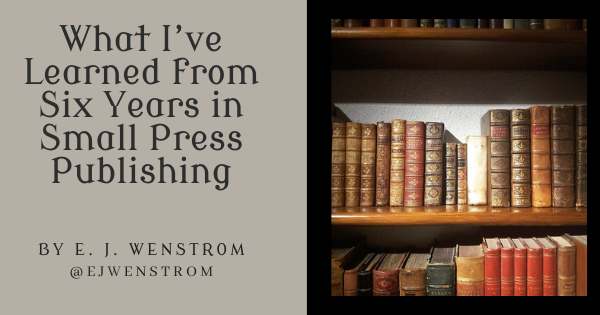
by E. J. Wenstrom, @ejwenstrom
I just released by fifth book, for which I worked with my second small press partner. I’ve learned a lot along the way about what small press has to offer, from its benefits to its limitations to the red flags to look out for.
The right small press can be an incredible way to get your books into readers’ hands! But it’s important to know what you’re looking for in a publisher, take steps to know who you’re getting into business with, and be an active partner in the process.
Here are a few steps authors should take for a great small press experience:
1. Do your homework
A small press can be an incredible partner, but not all small presses are equal. In fact, they can range wildly from established and esteemed pillars of publishing, to new kids on the block with innovative new approaches, to the downright predatory.
Before signing with any small press, an author must know what they want from a publisher, what kinds of risks they are comfortable with (if any) and whether the publisher’s standards and style align with your own.
Does the publisher have experience in your genre? Are their covers professional? What do their current and past authors have to say about their experiences?
There are myriad resources online flagging bad practices, offering resources for what to ask a small press, and even letting you tap into the collective whisper network such as AbsoluteWrite, QueryTracker and Writer Beware. Use them, and talk to your own network.
If you don’t have an agent to do this for you, get a literary lawyer to review the contract and make sure you’re legally protected, so that you’re not left vulnerable to sharks or even well-intended flops should the press go under, prevent the press from holding your book in revisions for years, and so forth. The Authors Guild offers contract review among its legal support services to members and is well worth it!
With all of this information in and, it’s time to assess. Are you comfortable with the publisher’s arrangement? The risks? The people you’ll be working with? There are no wrong answers to this, just what’s right for you.
2. You are your book’s best advocate
Okay, this isn’t just a small press thing, this is an all-the-time thing.
But while major publishers may not involve an author at all in how the book is packaged or marketed, often, small presses involve the author every step of the way. This means you’re in a great position to advocate for your vision for the book, from how revisions are approached to your cover, to the blurb copy.
So take advantage of this and advocate for your vision. This is your book. This is what’s great about small press.
This creative freedom comes with responsibility—because yeah, small press can mean more hustle for the author. So be ready to lean in and participate. Personally, I’ve really enjoyed being able to be so active in these steps, but you do have to go in with a mindset of ownership.
3. Foster a “long-term growth” mindset
Only a handful of authors at even the top major publishers get robust backing for a huge launch. Today, authors need to plan to be a big player in their book’s launch, and that’s true regardless of your publishing path, but especially true for small press authors.
If you’re going small press, you can still build meaningful buzz around your book’s launch, and most small presses will be a partner in that effort with you. But don’t assume they’ll be providing you with a big boost.
Personally, as a communications professional, I don’t find it wise to hinge your book’s fate on a single moment in time anyway. A book launch is merely a starting line. Take advantage of the launch to do what you can, but it’s more important to think long-term.
Steady growth beats small bursts every time, and as a small press author, take heart that it doesn’t all ride on that initial Amazon ranking! What can you do next week to keep building your readership? Next month? Next year? Focus on that steady build and meaningful connections with individual readers over time.
Above all, write that next book.
Small Press Offers Opportunity and Creative Agency
There are more publishing paths available to authors today than ever before. Caught between the major publishers and self-publishing, it’s easy to overlook or dismiss small press. But if I’ve learned anything from my small press publishing experiences, it’s that I love small presses.
With the right partner, small press publishing can be a rewarding opportunity. It lets you build a readership and gain experience a professional—I’ve even made some of my best author friendships through my small presses.
Not all small presses are equally great, but by doing your due diligence, understanding what you what in a publishing partner, and planning strategically to build your platform, the right small press has a lot to offer.

 E. J. Wenstrom believes in complicated heroes, horrifying monsters, purple hair dye and standing to the right on escalators so the left side can walk. She writes dark speculative fiction for adults and teens, including her new release, a young adult dystopian novel titled Departures (August 10, 2021). When she isn’t writing fiction, E. J. Wenstrom is a regular contributor to DIY MFA and BookRiot, and co-hosts the Fantasy+Girl Podcast. Learn more at her website.
E. J. Wenstrom believes in complicated heroes, horrifying monsters, purple hair dye and standing to the right on escalators so the left side can walk. She writes dark speculative fiction for adults and teens, including her new release, a young adult dystopian novel titled Departures (August 10, 2021). When she isn’t writing fiction, E. J. Wenstrom is a regular contributor to DIY MFA and BookRiot, and co-hosts the Fantasy+Girl Podcast. Learn more at her website.
3 Steps for a Great Small Press Experience by @EJWenstrom : Share on X
Photo credit: jafsegal (Thanks for the 5 million views) on Visualhunt
Thanks for the post, E.J.! I especially like the importance of long-term growth. It’s so true that publishing has a “long tail” and tons of promo for releases isn’t as important as it used to be. :)
Thanks for having me! It’s so true! Every new book I release, I see growth that far exceeds the single book, across my full set of titles.
I’ve been with my small press for over ten years and it’s been a great experience. They do involve me in the process, and that includes finding reviewers and booking tours.
That involvement through the process is one of the most rewarding things about small press, in my opinion! Cheers!
This is really good advice, for which thanks. I couldn’t agree more about how important it is to do the homework, choose the right press for you, and then advocate for your book. No-one else knows the book like the author!
Definitely! Knowing what you do and don’t want goes a long way … and it’s okay to try a few different approaches too and see what works for you.
We can’t offer advancements or huge sales, but DLP does try to give the personal touch to every author and book.
Love that!
Yes, there are pros and cons of small presses. Thanks for sharing your experience with working with one. And Jane Friedman just interviewed two agents about there takes on small presses today too.
I saw that! What kismet!
Hi Elizabeth – what a great sensible post from EJ – she seems to have the right approach to publishing … always keeping that escalator of books coming around – be she standing on the right, or running up the left side! Good luck to you both – cheers Hilary
An author (and pedestrian) after my own heart ;)